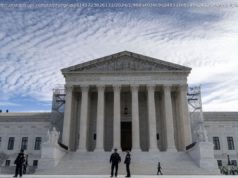President Trump’s tweets about reinstating the ban on transgender soldiers, though they cause uncertainty, will most likely not hold under careful judicial review, writes Shannon Minter.
Amidst widespread speculation about the President’s motivations for such an abrupt shift, those most shaken by the announcement were transgender service members themselves, whose futures are now at risk.
Since 2016, according to the National Center on Transgender Equality, an estimated 15,000 transgender soldiers have been serving openly. Many have been deployed overseas in Afghanistan and other countries. With a tweet, the President has cast their status into doubt.
For now, the policy permitting open service by transgender soldiers remains in effect, but many future legal questions loom.
The President’s tweets have no immediate legal impact. The Department of Defense website still has a page showing its “Transgender Policy” which has been in place since June 30 of last year. It states: “Effective immediately, transgender Service members may serve openly, and they can no longer be discharged or otherwise separated from the military solely for being transgender individuals.”
But if the Department of Defense were to reinstate the ban, would transgender service members who are already serving be dismissed? Would the discharges be honorable or dishonorable? Would retirement pension benefits be taken away? Would access to other veteran’s benefits be denied?
Any attempt to discharge transgender soldiers would also raise serious equal protection concerns.
On its face, such a policy would target a class of persons — transgender people — based on a characteristic that, by the military’s own admission in its recent careful study of the issue, has no bearing on their fitness to serve.
Even under the lowest level of equal protection review, which requires that any classification must have at least a rational basis, such a policy would likely fail.
To be sure, courts generally give considerable deference to the judgment of military officials. But the rationale for that deference would be sharply undercut in this case.
Before adopting its new policy in 2016, the military subjected the issue to exhaustive review, conferring with medical experts, examining all available data, and studying the experiences of other countries. Based on that extensive investigation, the Department of Defense concluded that permitting transgender soldiers to serve would not be disruptive or costly and would enhance military readiness.
In light of those conclusions, a sudden reversal of policy based on the President’s tweets would likely elicit careful judicial review. Unlike a policy based on the considered judgment of military officials, such a policy would likely be viewed as reflecting an improper political purpose or animosity toward a disfavored group.
In sum, despite the President’s ominous tweets, transgender soldiers continue to serve openly and proudly in every branch of our nation’s military. And with the help of the courts, that is unlikely to change, even if the President strong-arms the Department of Defense into turning back the clock to reinstate its prior ban.






